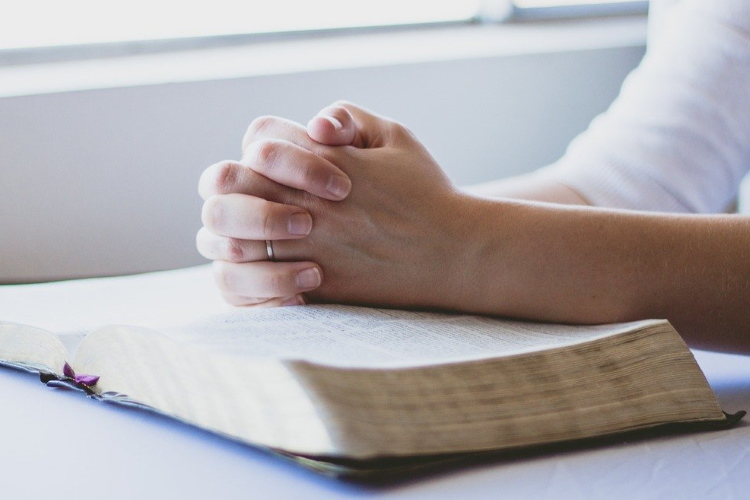Opinion

I shall pray for you… whether you like it or not!
Ian Boughton has been wondering whether or not we should tell people we are praying for them.
The wife of a former bandmate has died. It was not unexpected – she had been fading for some time, but still the end came rather quicker than anyone had foreseen.
During her last few days, I was chatting to a mutual friend, who happened to remark: “I told her I’d been praying for her... I think it is important to let people know you have prayed for them”.
I have not been able to get that remark out of my mind. I have always found it awkward to say that I have prayed for someone; I think I have a long-standing fear that I shall sound pompous and self-righteous, as in those 1960s TV sitcoms where a fat vicar would solemnly intone: ‘I shall pray for you, my son...’ as if they’re the one with a direct line to God.
This puzzle occupied me so much that I consulted a number of friends, several of them ordained, on whether they think it important, or necessary, to tell someone they have been the recipient of prayer.
The responses were mainly in the affirmative – but not unanimously.
In a typical response, a Norfolk minister said: “with some, it certainly does give support and encouragement; with others it can be best to just pray quietly for them.”
Others shared my own reticence about offering prayer. McK of Worcestershire said: “we find it difficult when we know someone has died leaving a partner or family – it is because we fear upsetting someone even more after their loss. But we find the consensus of opinion is that you shouldn't worry about it, as many bereaved people say they wish people would talk to them.”
It’s fine to offer prayer if you really mean it and your promise is not just empty words, said RP from Vermont. “If you know that a friend or family member would be comforted by your prayers, I wouldn't hesitate to let them know that you are praying for them… as long as you really are!”
By contrast and perhaps surprisingly, the retired-rev J from rural Cornwall told me that no, she does not tell anyone she is praying for them: “I very rarely tell anyone – it always embarrasses people and complicates a one-to-one relationship. The fact that it’s my job to pray means, I think, that most people presume I am doing so without being told or asked.”
What if the recipient does not believe in prayer?
M of Wolverhampton, married to a lay preacher, is curious about this: “people do change into believers in later stages of illnesses, and I think most people would appreciate any help, including spiritual, at that stage… I have had a chance to put that hypothesis into practice. A friend has had a diagnosis of bowel cancer and the treatment involved is very daunting, so we have been praying for him. He has no belief of any kind, as far as we know, so we thought: ‘when I tell him that he is in our prayers it will be interesting to see his reaction!’ - and the only reply I had was on WhatsApp, saying ‘thanks for that’. Not an entirely conclusive answer!”
One aspect which several of my respondents are clearly thinking deeply about, is: how private should a prayer request be? Is it an invasion of privacy to make the need of prayer widely known, as in a church newsletter?
A modern complication in all this, one respondent suggested, is the recent trend for online prayer chains, as used by many churches. In any online communication, there is the risk of information getting into the wrong hands – so is it unwise to ‘publicise’ that someone is the subject of prayer?
From the Midlands, DBS said: “our church uses an e-mail prayer chain, and people are always asked in advance: ‘would you like to go on the prayer chain?’ If the answer is yes, then their name and brief details of their situation are added to a list of those in need and circulated weekly to church members. But I don't think I would ever spring it on someone retrospectively that they have been included.”
In Norfolk, I consulted a church secretary who operates an online ‘prayer room’, in which recipients of prayer, and sometimes the reasons for it, are identified. Is it customary, or indeed is it required, for these people to know in advance that support has been requested for them?
“It has certainly not been made a requirement. It’s left to someone asking for prayer for another person, to determine whether or not they ask that person.”
There was general agreement that, as such requests for prayer are circulated only within the limited numbers of a single church fellowship, no breach of privacy is likely to have been committed.
However, the idea of learning that one has been prayed for was not unanimously approved: one quite vehement response was received.
This disturbing negative reaction came from someone who said: “as one who had prayer weaponised at me for fifty or more years, I would find the suggestion that I am being prayed for as being threatening and an attempt at intimidation. That is the result of being raised in the… (I’ve deleted the name of the sect). Prayer can be, and is, used as an instrument of abuse.”
Perhaps reassuringly, this was the only reaction of its kind. Virtually all my respondents took the view that people who are the subjects of prayer do find it a positive thing to hear of the concern of others.
M, a nurse from Oxfordshire, told me that she is always heartened by the reactions of people for whom she asks permission to pray. They appreciate both her asking them, and then for praying. “I absolutely do think it is right to tell them or ask them! And what is amazing is that they always say, ‘thank you’.”
My little debate was rounded off by a delightfully cheeky follow-up from R of Norfolk, whose initial remark started the whole thing.
“If curses are said to work better when someone knows they’re cursed... then why shouldn’t the same apply to prayers?!”
 Ian Boughton is a musician and author and retired journalist who lives in Dilham in Norfolk.
Ian Boughton is a musician and author and retired journalist who lives in Dilham in Norfolk.
The views carried here are those of the author, not of Network Norfolk, and are intended to stimulate constructive and good-natured debate between website users.
We welcome your thoughts and comments, posted below, upon the ideas expressed here.
Click here to read our forum and comment posting guidelines